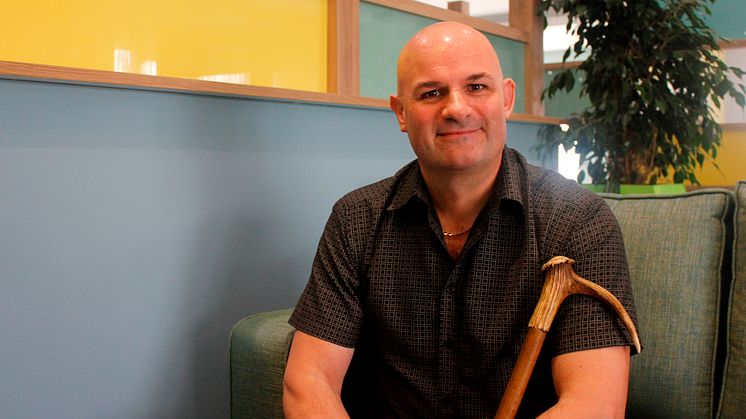
Press release -
Wales campaign launched to lower the nation's risk of stroke
Today the Stroke Association will launch a Wales wide campaign aimed at reducing the number of strokes across Wales.
Three specific risk factors put people at an increased risk of having a stroke. The “Lower Your Risk of Stroke” campaign will get to grips with the number of strokes caused by high blood pressure, atrial fibrillation (AF) and Transient Ischaemic Attacks (TIA), also known as mini strokes or “funny turns”.
Ana Palazon, Director Cymru at the Stroke Association, said:
“We are asking people to do three simple things. Get their blood pressure checked on an annual basis, check their pulse for any irregularity and lastly seek urgent medical attention should they experience stroke symptoms. By taking action on these three things, we could reduce the number of strokes across Wales by up to 50%.”
Gareth Davies, 53, from Mountain Ash, had a stroke in 2003 when he was driving home from work. He lost his memory as he was driving a journey he’d made for over 20 years but managed to find his street. By the time he got to his front door he could no longer speak.
Gareth was in hospital for six months following his stroke during which time he also found out he had cancer. Initially Gareth couldn’t walk, speak or swallow and he had weakness on the right side of his body. His arm muscles were affected which meant his arm was tight against his chest and he lost the dexterity in his fingers.
Gareth said:
“My doctor had only recently informed me that I had high blood pressure and I had no idea it put me at risk of stroke. Since my recovery I have been shocked that this condition is actually one of the biggest risk factors for stroke. By the time I had my blood pressure checked it was too late and I had a stroke before I could be put on any medication to control it.”
Uncontrolled high blood pressure accounts for up to 40% of all strokes. AF is the most common heart disorder in Wales. Those with AF are five times more likely to have a stroke and AF strokes are more likely to lead to death or leave the sufferer with high levels of disability.
The third biggest risk factor is TIA which happens when the brain’s blood supply is interrupted for a short time only. Symptoms are the same as stroke, but they are temporary. Often, people dismiss the symptoms of a TIA as a “funny turn”, however doing so could endanger life as TIA is a contributory factor for 21% of all strokes.
The Stroke Association is working with Public Health Wales, Community Pharmacy Wales and the seven health board’s across Wales to raise awareness across the whole population. The focus of the campaign will be asking members of the public to take responsibility for regularly checking their pulse and blood pressure and making sure they act when they suspect an irregularity or experience stroke symptoms.
Ana continued:
“All stroke symptoms should be treated seriously, no matter how quickly they pass. People should look out for facial weakness or drooping, loss of mobility down one side or problems with speech.
“The Act FAST message is vitally important, as the sooner people get medical help, the better their outcomes and the lesser their disability. By taking these simple actions we can conquer stroke.”
As part of the integrated campaign, all Community Pharmacies will be offering a quiz to those aged over fifty to reinforce the importance of a blood pressure and pulse checks and to remind them of the FAST message. Those who are on medication for either high blood pressure or AF will also be given stroke awareness advice and told how important it is to have a medicines usage review on a regular basis.
Gareth said:
“Stroke doesn’t discriminate. I considered myself in good shape before my stroke. I didn’t drink, didn’t smoke and I watched what I ate. My cholesterol was perfect. I was only 43 when I had my first stroke. I meet people now who haven’t had their blood pressure checked for ten years and when I tell them that I think it really has an impact that they need to have a check-up no matter how fit they may feel.
“When I heard the Stroke Association was launching this campaign I was very keen to add my voice and would urge everyone to take notice of these three simple actions: a blood pressure check, a pulse check and if you suspect a stroke call 999 immediately.”
For more information about the campaign, please visit www.stroke.org.uk or follow us on twitter @strokewales. If stroke has affected you or a family please ring our helpline on 0303 3033 100
Topics
Regions
A stroke is a brain attack which happens when the blood supply to the brain is cut off, caused by a clot or bleeding in the brain. There are around 152,000 strokes in the UK every year and it is the leading cause of severe adult disability. There are over 1.2 million people in the UK living with the effects of stroke.
Stroke Association is a charity. We believe in life after stroke and together we can conquer stroke. We work directly with stroke survivors and their families and carers, with health and social care professionals and with scientists and researchers. We campaign to improve stroke care and support people to make the best recovery they can. We fund research to develop new treatments and ways of preventing stroke. The Stroke Helpline (0303 303 3100) provides information and support on stroke. More information can be found at www.stroke.org.uk










